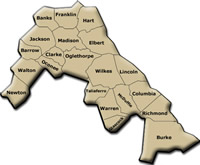About the 10th Judicial District ADR Program . . .
SERVING THE ALCOVY, NORTHERN
& WESTERN CIRCUITS
& WESTERN CIRCUITS
The district oversees the operation of the 10th District Alternative Dispute Resolution (ADR) Program that serves the Alcovy, Northern, and Western Circuits. The court-annexed ADR Office provides these courts case disposition alternatives to include mediation, arbitration, case evaluation and the Divorcing Parents Seminar.
The Tenth Judicial District ADR Program began on November 6, 1994 serving only the Western Circuit (Athens-Clarke and Oconee counties). The Northern Circuit (Elbert, Franklin, Hart, Madison, and Oglethorpe counties) joined in 1997 and the Alcovy Circuit (Newton and Walton counties) joined in 2000.
The program serves the Superior, State, Magistrate, and Probate Courts of all nine counties.
Cases are referred to mediation by order of the assigned Judge, by recommendation of the program director/program coordinator or at the request of the parties (or their attorney).
Trained, registered mediators contract with the program to conduct the mediation sessions. ������ In Superior, State and Probate cases, mediators are compensated by the parties participating in dispute resolution. Mediation services are free to parties in Magistrate Court cases.
An average success rate of 68-70% greatly reduces the need for civil jury or bench trials in these courts.
Frequently Asked Questions
What is Mediation?Mediation is a process by which a neutral third party facilitates negotiations between parties in conflict. Its object is to assist the parties in reaching an agreement which is satisfactory, fair and acceptable to all parties.
Domestic mediation is appropriate in divorce, custody, modification, and some contempt cases.
A mediator will work with the parties in an effort to bring about an agreement between the spouses or former spouses, concerning financial issues, co-parenting arrangements, and division of property and debts.
Mediation may be appropriate in account, product liability, auto accident, personal injury, malpractice and wrongful death cases.
Why Should You Use Mediation?
Mediation has several advantages over the traditional litigation process.
- Mediation presents a "win-win" result, rather than the "win-lose" result generated in an adverse court proceeding, which is beneficial to each side.
- If two parties can reach an agreement privately through mediation, they can avoid theconfrontational proceeding in a traditional courtroom battle.
- Mediation is less costly to both parties and the court system.
- A less formal, more comfortable setting facilitates an agreeable atmosphere.
- The parties maintain control of the terms of the settlement and decide together what is best for them
No. The Judge and the ADR Office will work together to determine if a case is appropriate for mediation. If significant violence has occurred during a relationship, or if a party cannot negotiate on an equal footing with the other, the case may not be appropriate for mediation.
How Long Does Mediation Take?
The length and number of sessions will vary by complexity and number of issues to be discussed. You should plan to spend a minimum of two hours at your initial session.
Who Will Be My Mediation?
The person assigned to mediate your case will be a trained professional who has met all standards established by the State ADR Office and the Tenth Judicial District.
What Will Mediation Cost?
The Court in which your case was filed has an established fee for mediation. The fee will be stated in the order referring your case to mediation, or can be obtained from the ADR Office. Mediation sessions will be held at no cost for anyone who is unable to afford the cost. All requests for fee waivers or fee reductions are to be made to the Tenth District Alternative Dispute Resolution Office prior to the mediation session.
Please be prepared to pay your mediator at the time of the mediation session.
Who Should Attend the Mediation Session?
Only parties to the case are required to attend the mediation session. You do not need to bring witnesses to the session. You do not need to bring witnesses to the session. Only parties and attorneys will be allowed in the mediation session.
Your attorney may attend the mediation session, though his/her presence is not mandatory. Only you and your attorney can decide whether your attorney should be present at the session.
Any agreement reached in the mediation session should be reviewed by your attorney prior to its presentation to the court.
How Do I Prepare For the Mediation Sessions?
A copy of your financial affidavit that has been filed with the court is required to be brought to the session if support, alimony and property issues are to be discussed. The parties may also be asked to prepare a budget, depending on the issue to be mediated. You should also bring any documents related to property and debts to verify mortgage amounts, property values, account balances, etc. If the court has already entered an order in your case, you should also bring a copy to the mediation.
Please call your attorney or the Tenth District ADR Office if you have questions about bringing documents.
What Will Happen If We Reach An Agreement?
The Mediator will put in writing the terms of the agreement which you must take to your attorney for review. If both parties and their attorneys are satisfied with the agreement, it will be made the order of the Court.
In divorce cases, a final judgment and decree must be entered by the assigned Judge.
What Will Happen If We do Not Reach An Agreement?
The ADR Office will notify the Court that your mediation was unsuccessful. Your case will then continue through the court process.
Scheduling Information
When the Judge refers a case to mediation the Alternative Dispute Resolution Office is notified. The ADR Office will notify you of the date, time and location of your mediation session. If the session must be rescheduled for any reason, you must notify the ADR Office at least 24 hours prior to the scheduled time. Failure to appear at the session, or to give proper notice, may result in sanctions being assessed against you.





















